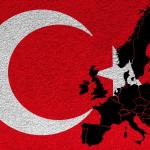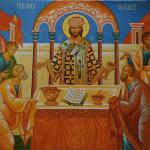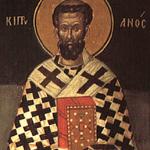![Orthodox icon showing Zacchaeus in the sycamore, behind, the tree is believed to be the ancient sycamore of Zacchaeus. Ortodox icon Greek Orthodox Monastery of the Prophet Elisha, Jericho, Palestine. - by ProtoplasmaKid, 2 August 2011, 14:28:08 (Monasterio_Griego_Ortodoxo_del_profeta_Eliseo_-_Sicomoro_de_Zaqueo_-_2) (CC BY-SA 4.0 [https://creativecommons.org/licenses/by-sa/4.0/deed.en]), via Wikimedia Commons](https://wp-media.patheos.com/blogs/sites/721/2018/01/Monasterio_Griego_Ortodoxo_del_profeta_Eliseo_-_Sicomoro_de_Zaqueo_-_2.jpg)
At least in the Anthology our church uses for Divine Liturgy, Zacchaeus Sunday doesn’t have its own tropar or Kondak hymn, the songs that announce the theme of the week. Zacchaeus Sunday refers to the Gospel that is read, the one we stand up to with Alleluia acclamations and proclamations of glory to our Lord Jesus Christ.
But as we worked through the Liturgy of the Catechumens this week – the part of the Divine Liturgy where the Word of God is proclaimed and taught – I was struck more by the Epistle reading. I am in Chicago now, so it only hit me in English; if I were in Richmond, I suspect it would have been a double whammy as I usually tune out the English in favor of listening to the Chinese, hearing it in the language of my heart. The words that struck me, here in the David Bentley Hart translation, were in the second half of the reading:
Let no one hold your youth in disdain, but instead become a model for the faithful in speech, in comportment, in love, in faithfulness, in purity. Until I come, devote yourself to public reading, to exhortation, to teaching. Do not neglect the gracious gift that is within you, which was given to you through prophecy accompanied by a laying-on of hands by the company of elders. Ponder these things; be absorbed in them, so that your advancement may be apparent to all. (1 Timothy 4.12-15, The New Testament: A Translation, p. 419).
I grew up in Chinese evangelical churches, which I have increasingly thought of as connected much more to the evangelical movement, the Anglo-American one that has taken the world by storm by claiming that it is increasingly non-white. We were taught that every passage of Scripture has a personal application. I learned the prescription here, of course, from a white evangelical source, G.T. and the Halo Express. These were a series of audiotapes I grew up listening to in the car where an angel named Glad Tidings (hence G.T.) and his angelic choir friends, the Halo Express, sing Bible verse songs to elementary school students going through playground politics. Evangelicalism is a hard habit to break, so as much Galician chant as I might practice in liturgy, the G.T. songs often come back to me, especially when I am dealing with academic politics, which are not as different from the playground as one might think.
For G.T., this passage was especially addressed to children. You might be tempted to take an unethical shortcut or participate in bullying or tell a white lie. But being young is not an excuse. In the interpretation of the Halo Express, the Bible says that you have to set an example as a Christian for other Christians who might be watching you in your character. This mandate is especially frightening for me as a secular academic in a junior capacity. Not only am I very low on the totem pole in academia, but I am always reminded that I am young for someone in my job by people who look at me and wonder what part of me is a ‘professor.’
I later learned that the New Testament letters were addressed to churches, not individuals, and that they were read the same way that we read them in the liturgy: as proclamations of the Word of God to the Church. The Timothy and Titus letters are especially interesting to consider in this light. They are addressed to individuals but read in the context of the church. That’s because Timothy and Titus were the overseers of their respective local churches, which I had always thought was synonymous with congregation. It didn’t hit me until I became Anglican that to be an overseer, an episkopos, was to be that church’s bishop.
That changes the game quite a bit. The passage is not about me. It is about Holy Timothy, bishop of the local church of Ephesus. The Holy Apostle Paul is charging him in the hearing of the entire congregation to not let us, the people, disdain him because he is young. I later discovered that this question of the bishop’s age in relation to his character was a prevalent theme in the early churches when I read the Holy Martyr Ignatius’s letter to the Magnesians. Regarding their young bishop Damas, Ignatius writes:
Now, it is not right to presume on the youthfulness of your bishop. You ought to respect him as fully as you respect the authority of God the Father. Your holy presbyters, I know, have not taken unfair advantage of his apparent youthfulness, but in their godly wisdom have deferred to him – nay, rather, not so much to him as to the Father of Jesus Christ, who is everybody’s bishop. For the honor, then, of him who loved us, we ought to obey without dissembling, since the real issue is not that a man misleads a bishop whom he can see, but that he defrauds the One who is invisible. In such a case he must reckon, not with a human being, but with God who knows his secrets.
We have not only to be called Christians, but to be Christians. It is the same thing as calling a man a bishop and then doing everything in disregard of him. Such people seem to me to be acting against their conscience, since they do not come to the valid and authorized services. (Ign. Magnesians 3-4, trans. Cyril Richardson, p. 95).
Like Timothy, Damas is the bishop of a local church despite his age. It would be easy for ecclesial political operatives to play him like a fiddle, quite like how the Jedi Council and Chancellor Palpatine literally play the young and inexperienced Anakin Skywalker into becoming a Sith (which is the truest interpretation of why the prequels are so painful to watch – the dialogue is as adolescent as the characters being portrayed). But like Paul, Ignatius reminds the church of who they are as church. Their gathering is around the holy mysteries. The bishop presides over the mystagogical work of the people in the place of the Father. The people are Christians because of their participation in these ‘valid and authorized services.’
In their turn, bishops like Timothy and Damas are to set an example to us ‘in speech, in comportment, in love, in faithfulness, in purity,’ overseeing the mystagogical acts of public reading, exhortation, and teaching – precisely what goes on in the very Liturgy of the Catechumens where I am hearing these words. The church has ordained them, laid hands on them, declared Axios! over them. We watch their growth in mystagogy, we join them in their absorption in the holy mysteries, we experience the same theosis that we see in them.
And yet, in this way, the church relativizes age, as it also does height and ideology, if we return to Zacchaeus the tax collector. What matters is neither nature nor nurture, but the Lord Jesus Christ. The Lord does not know Zacchaeus as a tax collector, as ‘small of stature,’ as the climber of the sycamore tree, or as a ‘sinner.’ Instead, when Zacchaeus performs the mysterious acts of repentance of giving half of his possessions to the destitute and restoring fourfold to anyone he has defrauded, the Lord declares to him: ‘Today salvation has come to his house, because he too is a son of Abraham. For the Son of Man came to seek and to save what has been lost’ (Luke 19.9-10, The New Testament: A Translation, p. 152). Unlike Timothy and Damas, Zacchaeus is no bishop. Yet in him, we see what the process of theosis looks like. It begins with repentance, with a discovery that one has always been fundamentally a ‘son of Abraham,’ lost though one may have been. But the Son of Man, the person that the Holy Prophets Ezekiel saw as enthroned upon the cherubim who are what Holy Macarius the Great called all light, all face, all eye (Homily 1.2), has personally encountered the sinner, transforming him back to what he originally was: the descendant of the one who believed the promises of God hope against hope and was justified.
In the pre-preparation for the Preparation of the Great Fast, the Lord has met me through his word, his verbal icon by which our Patriarch reminds us in his ‘Vibrant Parish’ pastoral letter that ‘we come to know Christ, we encounter Him, and enter into a living relationship with Him.’ The work that the Lord has for me as a Christian is the same as for all Christians: to encounter him as one under the omophor of my bishop in the mysteries by which we the people, including our bishops, partake of the divine nature and are transformed from glory to glory.
Maybe all those years ago, G.T. and the Halo Express did have a point. The journey of theosis certainly transforms my practice of politics, whether on the playground or in the halls of the academy where I work. But such transformation, I was reminded today, begins in the work of the liturgy, in being taught through active participation in the holy mysteries together with my sisters and brothers. As Macarius allegorizes the vision of Ezekiel about the Son of Man: ‘For the soul that is deemed to be judged worthy to participate in the light of the Holy Spirit by becoming his throne and habitation, and is covered with the beauty of ineffable glory of the Spirit, becomes all light, all face, all eye’ (Homily 1.2). May I become as such, as all flame, in my praxis of politics, divinized with my sister and brother sinners re-discovering our identity as children of Abraham through our mystagogical encounter with Jesus Christ, our Lord and Savior.















